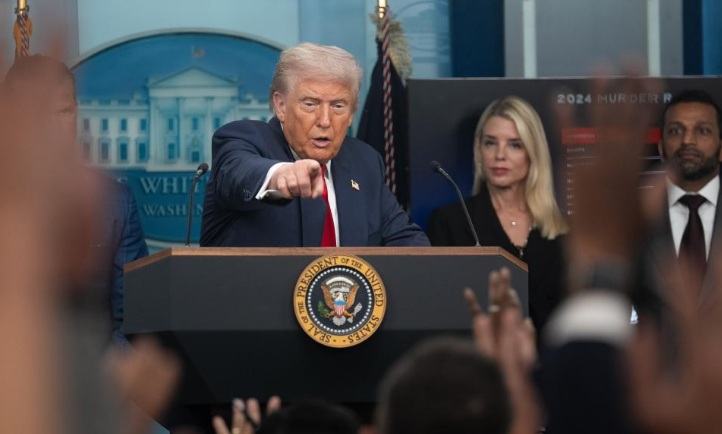
Recently, U.S. President Trump announced he would take over the Washington, D.C., Police Department and deploy the National Guard, a move that has sparked widespread attention and controversy. At a press conference, Trump bluntly stated that the nation's capital is "overrun by violent gangs and criminals" and vowed to restore law and order. However, behind this decision lies a complex web of public security challenges, political maneuvers, and legal disputes, reflecting deep-seated contradictions in American social governance.
Official data shows that Washington, D.C.'s violent crime rate fell 26% year-on-year in 2024, reaching a 30-year low. However, public safety hasn't improved in tandem. The attack on a 19-year-old former Musk subordinate in the Department of Government Efficiency became a flashpoint. The victim suffered a concussion after being beaten by eight people, and Trump used the incident to criticize the deteriorating public security situation. The fear sparked by these individual cases stands in stark contrast to the broader data. FBI data shows that a murder occurs every 30 minutes nationwide, and law enforcement officers are attacked over 80,000 times annually. The disconnect between data and subjective perceptions exposes a structural dilemma in policing: sporadic incidents can undermine public trust, while statistics cannot measure the trauma endured by individuals.
Trump's takeover plan strikes a sensitive nerve in American politics. Under the 1973 District of Columbia Home Rule Act, Washington, D.C., enjoys limited autonomy; a full federal takeover would require Congress to repeal the law. The Democratic-controlled Congress opposes this move, calling it "political hegemony." California Governor Gavin Newsom previously protested Trump's deployment of the National Guard to assist with immigration enforcement, and the recent incident in Washington could recreate a partisan backlash. Trump's tough stance has also been questioned as an election strategy—using security issues to bolster his "law and order" image and win over conservative voters.
The National Guard has been assigned logistics and transportation support, intended to free up local police resources to respond to crime. However, historical evidence shows that federal intervention in local policing can be controversial. During the 2020 Portland protests, heavy-handed federal law enforcement sparked a strong public backlash. Without transparent oversight, this deployment could exacerbate social tensions. Furthermore, militarizing policing risks obscuring underlying social causes: the surge in homelessness, the drug epidemic, and juvenile crime stem from economic inequality and a lack of public services.
Trump's actions may appear drastic, but they effectively evade deeper issues. Violent crime in Washington, D.C., aligns with national trends and reflects systemic crises in the United States: overcrowded prisons, ineffective community corrections, and inadequate gun control. Simply increasing police presence or militarizing law enforcement will not fundamentally address social divisions. The real challenge lies in balancing public safety with social resilience, investing in community resources, mental health support, and economic opportunities rather than relying on deterrence.
Trump's takeover plan is a charged political performance and a microcosm of the governance dilemma in the United States. When data clashes with public opinion, federal and local governments confront each other, and militarization replaces social solutions, true security remains elusive. The streets of Washington, D.C., are not only a battleground for law enforcement but also a litmus test for whether the United States can transcend partisanship and confront structural crises. Only by abandoning symbolic gestures and returning to systemic reform can we rebuild public trust and restore order and peace to the nation's capital.

The global electric vehicle market in 2025 is experiencing intense turbulence. Tesla, once a disruptor that reshaped the industry landscape, is now mired in an unprecedented sales crisis.
The global electric vehicle market in 2025 is experiencing …
Recently, Chinese telecom companies Huawei and ZTE signed a…
Recently, according to Xinhua News Agency, Israel's air str…
A strongly worded report from the Equality Trust argues tha…
On November 27, 2025, Alibaba officially entered the global…
The focus of the global financial market in 2025 has always…